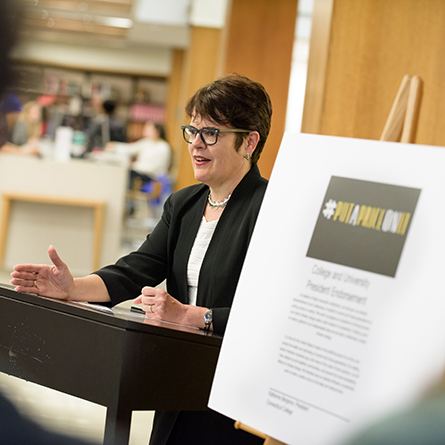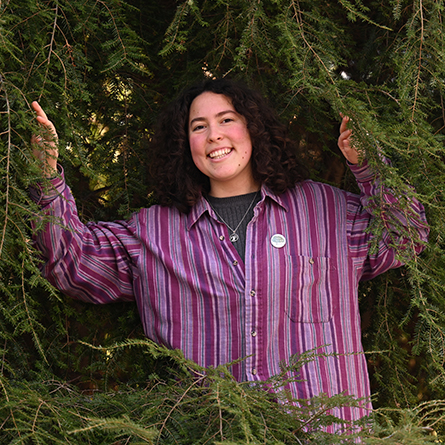
Conn endorses “Put a Price on It” campaign

Connecticut College, along with more than two-dozen colleges from across the country, has publicly endorsed putting a price on carbon as a way to reduce dependence on fossil fuels while increasing investments in renewable energy.
On May 5, campus community members joined President Katherine Bergeron at Shain Library, where she reaffirmed Connecticut College’s commitment to sustainability by endorsing the Put a Price on It campaign.
“Connecticut College is committed to policies and practices that are environmentally responsible and socially just, and the Put a Price on It movement falls directly in line with that commitment,” Bergeron said. “I was pleased to join a number of my fellow college presidents in endorsing it on behalf of the Connecticut College community.”
Put a Price on It is the joint effort of Our Climate, a national, youth-led climate change advocacy organization; and “Years of Living Dangerously,” the Emmy-Award winning National Geographic Channel documentary series.
Jane Dawson, Virginia Eason Weinmann '51 Professor of Environmental Studies & Government, calls climate change “the issue of this generation.”
“There's nothing more urgent than sustaining a healthy and liveable planet for young people growing up at this critical time and for generations to come,” said Dawson, who is also the Karla Heurich Harrison '28 Director of the Goodwin-Niering Center for the Environment.
“It's important that colleges and universities play a leading role in pushing for climate action at all levels—both politically and here on our own campus.”
Conn has a long history of environmental stewardship, and a commitment to sustainability that is highlighted in the College’s new strategic plan, Building on Strength. The Office of Sustainability is focused on reducing the College’s energy consumption while providing opportunities for students to explore sustainability solutions.
“The current generation of students is interested in sustainability,” said Margaret Bounds, assistant director of sustainability. “They want to know what their college is doing to be more sustainable. The campaign was a way for us to show we’re committed to sustainability on the national level.”
On April 6, Joel Bach and David Gelber, the creators and producers of “Years of Living Dangerously,” visited Conn to speak about the series and the Put a Price on It campaign.
During this visit, an online petition to support putting a price on carbon was distributed among the campus community, collecting more than 450 signatures.
Students Moriah McKenna ’17 and Jillian Ouellette ’17 led the petition effort, and presented the signatures to President Bergeron.
McKenna, a double major in biology and anthropology and a scholar in the Goodwin-Niering Center for the Environment, said grassroots and local change are what is needed to move forward with clean and renewable energy in the face of rapidly-evolving global climate change.
“Signing on to endorse the Put a Price On It campaign sends a crucial statement: that we, as an academic institution, are looking to the future and supporting the movement towards clean energy,” McKenna said.
“Becoming one of the first schools to sign on to this campaign puts action to the mission of Connecticut College to act as a global environmental steward, and helps to initiate a movement among all higher academic institutions in the nation to maintain support of the scientific community and continue to push for positive change.”
For Ouellette, an environmental studies major who worked as a senior fellow with the Office of Sustainability, a key takeaway from Bach and Gelber’s visit was that individuals and communities must continue to share facts on climate change. Having Connecticut College support the Put a Price on It campaign is part of the dialogue.
“Because Conn is an institution that practices shared governance and community inclusion, it was imperative to show President Bergeron how much support there was for this campaign and this type of collaborative solution across the campus and local community,” said Ouellette.
“This step is a symbolic call for more activism and action on the national level, and it is also a call for more collaboration between disciplines, departments, clubs and individuals on our campus.”
May 8, 2017
